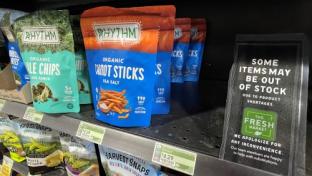Grocery Tax on Docket in Many States
As campaign season gets underway for a range of local, state and federal elections during an inflationary era, the issue of grocery taxes has been pushed into the forefront. The grocery tax – currently in place in 13 states – has landed on platforms of incumbents, challengers and in some cases, newly-elected officials promising relief to voters. In some states, the proposals to jettison grocery taxes have support from both sides of the aisle.
Recent grocery tax debates include the following:
- In Alabama, legislators introduced a bill on Jan. 18 to eliminate the state’s 4% grocery tax. Opponents argue that it will cause shortfalls in the state’s education budget. Alabama is one of three states that tax groceries at the full state sales tax rate.
- A bill was introduced in the Idaho legislature to increase the maximum credit that residents can receive on their grocery sales tax credit by $20. According to the nonpartisan group Associated Taxpayers of Idaho, 87% of that state's residents used the grocery sales tax credit.
- Illinois Governor J.B. Pritzker, who is running for reelection in 2022, announced that he wants to temporarily suspend the current 1% sales tax on groceries for the 2023 fiscal year that begins on July 1. The governor’s office claims that the move would save Illinoisans about $360 million.
- The Kansas legislature will take up the matter of abolishing the state’s food sales tax. The issue has support from the governor and legislators from both parties. Two different bills are before Kansas lawmakers, including one that widens the definition of food sales to include restaurants.
- The president of the Oklahoma state Senate introduced a bill to get rid of that state’s 4.5% sales tax on groceries. Local municipalities there have been known to levy additional sales taxes that bumped that grocery tax rate 10% in some areas.
- In Utah, a representative put forward a House bill that would remove the grocery sales tax, arguing that the move would help middle- and low-income families with high food costs. That proposal is currently in limbo.
- The new governor of Virginia, Glenn Youngkin, unveiled a plan to eliminate the state’s 2.5% grocery tax to help provide relief for Virginians. Youngkin, who appeared at an Alexandria, Va., Safeway store to promote the plan, noted that a current budget surplus could cover the loss of the monies received from the tax.
The 13 states that impose sales tax on groceries are Alabama, Arkansas, Hawaii, Idaho, Illinois, Kansas, Mississippi, Missouri, Oklahoma, South Dakota, Tennessee, Utah and Virginia. The rate varies by state, with 10 states offering a lower rate for groceries than the general sales tax and three states – Alabama, Mississippi and South Dakota – taxing groceries at the full state sales tax rate.







